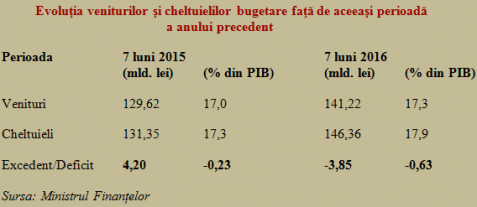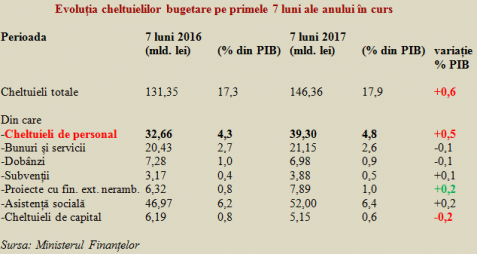 The consolidated general budget recorded a deficit of ROL 5.14 billion at the end of the first seven months of 2017, equivalent to 0.63% of the GDP estimated for the current year.
The consolidated general budget recorded a deficit of ROL 5.14 billion at the end of the first seven months of 2017, equivalent to 0.63% of the GDP estimated for the current year.
The result is well below the performance of last year when, on July 31, 2016, the budget balance was still negative but only at ROL- 1.73 billion lei or -0.23% of GDP.
The result of nearly three and a half billion lei weaker than in the first seven months of 2016 came from combining the advance of ROL 11.6 billion on the revenue side with over ROL 15 billion on the expenditure side. That is, Romania has pressed the accelerator on the expenditure side, above the otherwise real possibilities given by the good economic growth, until the budget implementation started to slide and smoke.
*
- Evolution of budget revenues and expenditure compared to the same period of last year
- Period Seven months 2015 (billion lei) (% GDP) Seven months 2016 (billion lei) (% GDP)
- Revenues
- Expenditure
- Surplus/deficit
- Source: Ministry of Finance
*
Note: Contrary to what the current government critics publicly and stubbornly circulated, no matter what the arguments, budget revenues have significantly increased in relation to GDP. That is, it has been collected more than last year from the economic growth. The real problem is the hazardous spending, with a destabilizing effect on the national currency.
If we had limited ourselves in 2017 to go with the revenue increases in line with the economic growth compared to 2016, we would have had no public deficit after the first seven months of the year.
At the end of July, we would have had revenues of 17.3% of GDP and expenditure of 17.3% of GDP.
The Government has missed the historic chance (which we shall not meet again soon and I hope to Goodness that I am wrong) to strengthen the mid-term hardly earned macroeconomic stability after a period of great sacrifices for the population.
A serious fact, if they have risen to a significantly higher proportion than revenues, expenditure has not even been oriented to development and investment, but went to the bottomless consumption based on questionable criteria (for example, by the pension point artificially inflated, to all pensioners in equal proportions, irrespective of the pension level).
To keep in mind, this September it is due to be paid over EUR 1 billion of the macroeconomic stabilization loan taken in 2009 from the European Union, an expenditure which we did not have in 2016, due to the programming of maturities related to the election campaign (as it turns out, not only that winter is not like summer, but 2017 is not like 2016).
But what happened on expenditure side?
By expenditure chapters, it is remarked how the clear exit from the salary part of 7% of GDP recommended by the international institutions and assumed in 2016 by our country went somehow off the track to eight and a half of GDP and the phenomenon can only worsen next year, as the measures in this regard were already taken by the Government.
Basically, almost all the expenditure increase was focused on staff costs, where it added more than half a percent of GDP in the first seven months. In fact, the additional social assistance has been applied so far by drastically limiting investment (see the 0.2% of GDP up and down), a sort of trade-in that sacrificed the social development and the future for immediate personal consumption in favour of the past.
*
- Evolution of budget expenditure in the first seven months of the current year
- Period Seven months 2016 (billion lei) (% GDP) Seven months 2017 (billion lei) (% GDP) Change %GDP
- Total expenditure
- Of which
- – staff costs
- – goods and services
- – interest
- – subsidies
- – projects with EU non-reimbursable financing
- – social assistance
- – capital expenditure
*
We recall that the arbitrary increase of pensions by 9% as of July 1, applied AFTER the 5% increase from January 1, 2017, will cause big and PERMANENT problems with the increasingly substantial deficit (more than four billion euros annually) of the social insurance budget. Experience has shown that the adjustment applied in a crisis context on benefits that assumed an eternal economic growth to high values can no longer be done for legal reasons.
We also remind the beneficiaries that by means of mandatory 30% – 40% subsidies from the state budget to cover the pension gap, they will pay by themselves a large part of their own pension, by paying VAT, excise duties, direct taxes, etc. And that comes at the cost of weakening the purchasing power of the national currency in which they collect their income.
By the way the current budget implementation is carried out the emphasis has clearly shifted from sustainable mid- and long-term development towards irresponsible short-term consumption. A tendency to increase and continue to be seen in the level of accumulated public deficits. Obviously, it cannot be a question of if but when a major slippage, with the corresponding painful corrections, would occur.











